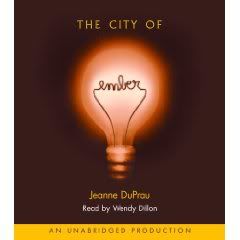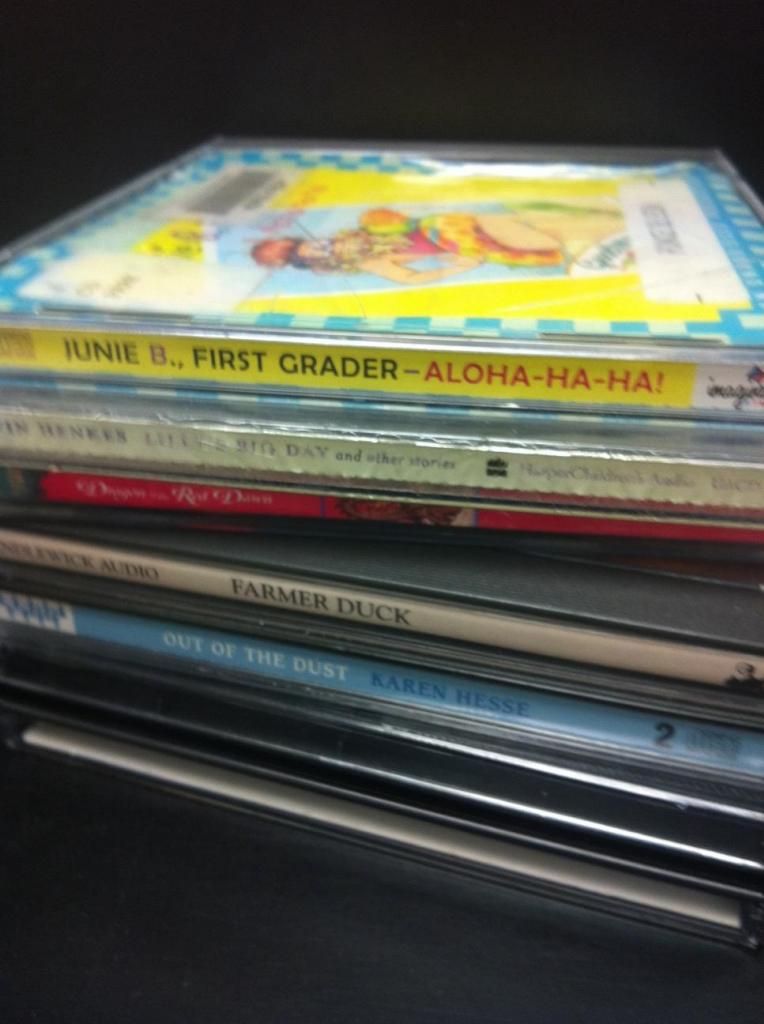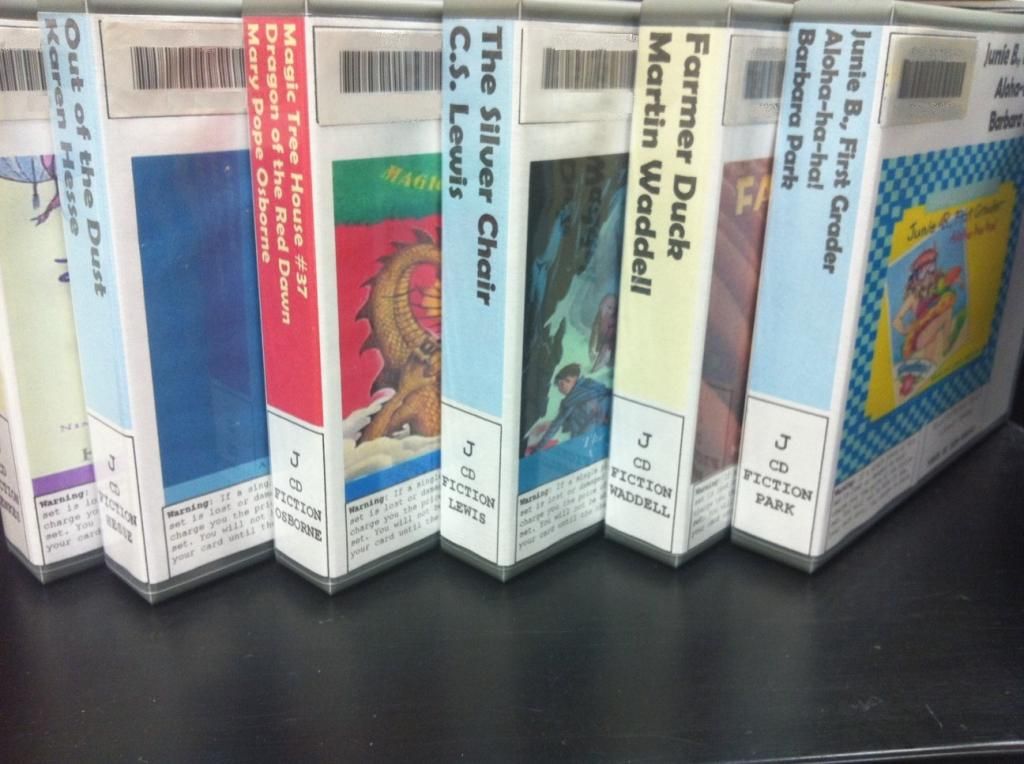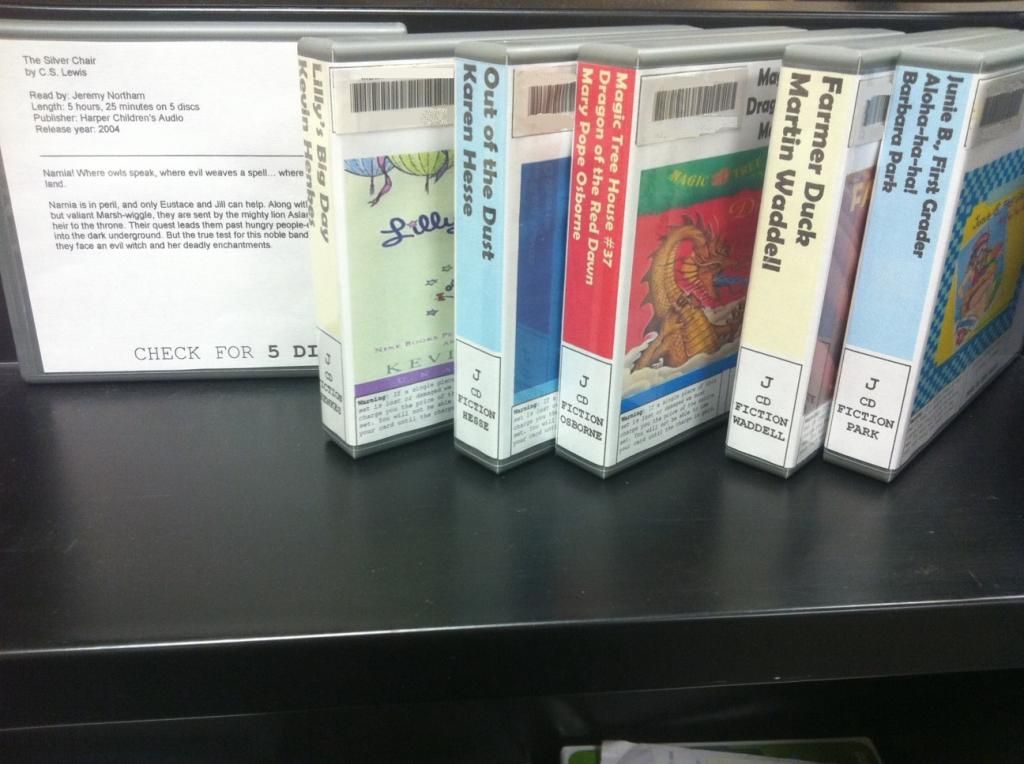My latest project has been re-housing kids audiobooks.
Here's the before picture:
The main issue with these is that the plastic jewel cases crack easily. The discs fall out or get scratched. Also, most of our audiobooks are in larger cases, so these slim little numbers get lost or mis-shelved on our library shelves easily.
I re-housed all of these in larger, sturdier "clam cases." This also puts the CD's in fabric and plastic pockets, instead of those snap-in plastic buttons. Much less chance of cracking or breaking this way.
I designed this template myself. The other thing that's nice - for the staff I put a large reminder of how many discs to look for. When audiobooks get returned at the library, the first thing we have to do is quickly check and make sure all the discs are there - it's surprisingly common for people to leave the last CD in their car player!
Hurrah! I've been seeing these audiobooks circulate more already!
Showing posts with label audiobooks. Show all posts
Showing posts with label audiobooks. Show all posts
Friday, March 22, 2013
Saturday, August 14, 2010
Free Audiobooks!
Check it out. Audiobookcommunity.com is offering free teen audiobooks for a limited time.
This week they are offering Beastly by Alix Flinn, read by Chris Patton, as well as The Strange Case of Doctor Jekyll and Mister Hyde by Robert Louis Stevenson, read by Scott Brick.
They use Overdrive software, which is also free to download.
This week they are offering Beastly by Alix Flinn, read by Chris Patton, as well as The Strange Case of Doctor Jekyll and Mister Hyde by Robert Louis Stevenson, read by Scott Brick.
They use Overdrive software, which is also free to download.
Monday, June 7, 2010
Diary of a Wimpy Kid multimedia review
I have to admit I was skeptical when I heard they were making a live-action movie version of Diary of a Wimpy Kid. The cartoons, so simple, so expressive, really are the heart of the book. How would it be possible to visualize Greg Heffley without them? My skepticism was only deepened by the fact that I had recently listened to the audiobook for Diary of a Wimpy Kid, which had failed to impress.
I had been planning on skipping listening to the audiobook altogether. How could you put such a visual presentation into audio? I was encouraged, however, by Brian Selznick's The Invention of Hugo Cabret. I'd scoffed (as many did) that it'd be an impossible task to translate that unique Caldecott-winning book into a different format, and was very pleasantly surprised to see that music had been used to skillfully create atmosphere in the story. So, I approached the audiobook of Diary of a Wimpy Kid with an open mind. Sadly, it failed to deliver. The narrator simply read the story. Naturally, without the cartoons, many of the sight gags simply fell flat.
I was understandably cautious when I went to see Diary of a Wimpy Kid but ended up delighted by the film. The movie used just enough of the cartoons to give the flavor of the books. It was true to the story, and honestly hilarious.
Any big fan of Diary of a Wimpy Kid (and these days, what middle-schooler isn't a fan of the enormously popular series?) will definitely want to take a look at the Movie Diary. It's chock-full of behind-the-scenes info and tidbits about the child actors who play Greg Heffley and his best friend Rowley, including baby pictures and some of the first sketches of Greg that Kinney produced. Many kids have a vague idea of how a movie gets made, but the book really breaks down the process step-by-step. For example, in the scene where Greg and Rowley are sledding, it's not real snow, of course. And it wasn't actually that cold on the day of shooting. The book talks about how make-up artists painted the boys' cheeks red to simulate the look of being out in cold weather. That's a little detail that might have escaped the average movie viewer.
Another interesting detail is how the location scouting was done. When the school was selected, an army of designers and set dressers came up with a school mascot, and created hundreds of items that might be found in the school, including flyers on the bulletin boards.
I enjoyed reading about the thought process behind the design of several of the main character's bedrooms. Rowley's room is supposed to reflect that his family is very well-off, that his rocket ship bed, and other stuff is really, really cool... but also a bit babyish for a typical middle-schooler. The designers had the idea that Greg is the kind of kid who pursues hobbies with a passion and then drops them. They figured that he had just finished a big "pirates" craze, which is why you see so many pirate-themed items in his room. But before that, he went through a "sports" craze, which is why his bedsheets and some items he's had longer are sports-themed. For Fregley, the designers decided that his parents must be older. They created a more old-fashioned looking room, with vintage floral wallpaper and clothes and bedding for him that look like they came from a thrift store. It's interesting to see how the designers take a few kernels of information from the book, and really run with it.
With plenty of photos from the set, original drawings by Kinney, and large hand-lettered type, this book will be a blazingly fast read for most, although I anticipate some readers will want to read and re-read this while they are waiting for the fifth book in the series, due out next fall.
Check out the Monday round-up of non-fiction reviews
at Charlotte's Library.
I blogged this during the 48-Hour Book Challenge.
I borrowed this book.
Labels:
audiobooks,
middle-grade fiction,
movies,
non-fiction,
reviews
Tuesday, September 15, 2009
Dystopian underground

In what we assume is the far future, Lina and her friend Doon live in what they believe to be the last bastion of humanity. A disintegrating city surrounded by darkness is reliant on the last of their dwindling stores. The Builders left Instructions for their descendants, which have been lost. Most of the townsfolk are content to continue scraping along with reduced rations, hoping that the Mayor will somehow find a solution. In a scene reminiscent of The Giver, Lina is pleased to receive her assignment for her new job: that of Messenger. Doon, on the other hand is assigned to the pipeworks. Together, they end up piecing together the secrets hidden in their city.
I'd been meaning to get around to reading this book for ages... and somehow it seems like in a blink of an eye, it's turned into a whole series, and a (not terribly successful) movie. I listened to this on audio. Wendy Dillon created all of the unique and distinct characters, for a fully realized sound recording with a bit of music and foley sound effects here and there. Lina's voice seemed so very young, and child-like. A bit carefree. Doon is the "responsible" one seeing the danger in the city as they are running low on supplies, including lightbulbs. I was mystified by their situation at first. The adults in the town seem strangely incurious, bureaucratic and ineffective. A lot of them seemed like mealy-mouthed whiners to me, because they see the supplies running out, but aren't willing to fight for any solutions.
The city is surrounded by darkness, and beyond the trashdumps are the Unexplored Regions. I saw a few plotholes here. Everyone has a ravening, unceasing fear of the dark. Everyone? Really? With no exceptions? People have difficulty navigating their own houses that they've lived in all their lives without the help of the lights? Over several generations in a town of a fair sized population, not one person has ever happened to be blind and thus not afraid of the dark? Mysterious. The pace of this was excruciatingly slow. Some readers could argue that people who have no knowlege of anything else in the outside world WOULD take a long time to puzzle out things which might be obvious to us. I wondered too, if I would have enjoyed this book more if I had read it (so that I could read it quickly) rather than listening to it, where I was forced to follow along at the careful, slow pace as set out. This is a solidly imagined world -- Lina's knowledge of flora and fauna for example, is limited to a few insects and a couple of varieties of garden vegetables. She has trouble understanding what a boat is, or how to use a candle.
The story has a satisfying ending, but is still quite open for more in the series. The title, of course, seems a bit allegorical (The City of Ember is nearly out of light and the next book, The People of Sparks is presumeably about the city folk's fresh start in a new community) I don't know if I'll be tackling the rest of this series anytime soon... between this and Philip Reeve's excellent though thoroughly terrifying Hungry City Chronicles, I've had quite my fill of post-apocolyptic dystopian future epics. I see this series aimed at teens, which surprises me a bit. The characters are both twelve, but there's no romance of any sort in the book, and their mindset seems so much younger. I'd pitch this to fourth and fifth graders, no problem.
Labels:
audiobooks,
dystopian,
middle-grade fiction,
reviews
Saturday, July 4, 2009
Farms and Football

I was immediately drawn in by the eye-catching cover on this audiobook featuring an adorable cow wearing a tiara. Unfortunately, the cover has been changed for the paperback edition. The new cover features a boy and girl, reclining in a green field.
D.J. Schwenk is a girl jock in a sports-obsessed family in rural Red Bend, Wisconsin. Her older brothers have gone off to college on football scholarships, and when her father needs hip surgery, it falls on her shoulders to keep the dairy farm going over the summer. The cows have been named after famous football players and coaches, and, of course, 4-H plays an important part in their lives. D.J. takes up an offer from a family friend to help train a player for the neighboring football team (as if she doesn't have enough to do already.) But, football is her passion, and over the course of the summer, she comes to realize she doesn't want to be a coach, what she really wants to do is play the game herself. I thought her gradual coming around to the decision of wanting to play football was very well done. It's a journey and she takes you along with her.
D.J. is funny and likable, and almost too nice. I can't believe how much she does on the farm, how much she forgives and how quick she is to see other people's sides, especially Brian Nelson who was the instrument of her brother's football field humiliation a year ago. But, it is a small town where you must move past and live with these things if you want to be able to cope at all. D.J. and her family aren't big talkers: "When you don't talk, there's a lot of stuff that ends up not getting said." Her younger brother Curtis almost never speaks at all. It turns out that he secretly wants to be a dentist, and in a family of jocks, he feels like a misfit. Anything that strikes her as sensitive, kind or intelligent she thinks of in terms of her heroine, Oprah Winfrey.
D.J. isn't perfect... when her best friend Amber comes out to her, she drops her like a hot potato, uncertain of how to handle this surprising news. Thankfully, things do resolve in a satisfactory way by the end of the story. D.J. handles being called names, "dyke" and so on for being a female athlete with aplomb.
The only thing that I found unbelievable was the turn-around with D.J.'s dad suddenly being a "good cook" by the end of the summer. When D.J. describes one casserole dish as being akin to "hot vomit" I was utterly grossed out. And her father's improvised chicken and prunes dish sounded positively nauseating. At the end of the book, when D.J. admits that her dad's meals are "actually pretty good." I just couldn't believe it. No way, no how.
I enjoyed the accent, although I had to wonder: would it be considered accurate enough to please a Wisconsin native? The last audiobook I listened to had plenty of positive reviews for the New England accent -- though it didn't sound entirely genuine to me. Natalie Moore's narration sounded believable. It was strong enough to give a sense of place, yet not indecipherable in the least.
Dairy Queen took me to a completely different world. I can't imagine being a jock. Can't imagine being surrounded by people who like and actually care about football. Can't imagine living on a farm. But, I found the characters and situations to be compelling and relatable, nonetheless. The story is soon to be a trilogy. There is a sequel: The Off Season, and the third book, Front and Center will be released this fall. There are also rumors that the book may be in development for a movie or tv series.
Friday, May 29, 2009
Trouble me

I've got a longish commute, and nothing makes the time in the car fly by like listening to an audiobook (and what a great way to get caught up on all those books on my "to read" list!)
I got the impression this was supposed to take place in the late 70's, or possibly early 80's. I'd heard that the story takes place in Maine and deals with Cambodian immigration. Having grown up in Maine around Cambodian refugees myself, that was enough to hook me right there. It's not terribly often that Maine shows up as a locale (One Morning in Maine by Robert McCloskey, aside) in children's books so I was interested to see what Schmidt would have to say about it, and how the audiobook reader, Jason Culp, would make it sound.
I don't feel that Culp completely got the accent. It turns out the family is from Massachusetts. He sounds like a man trying to do a Boston accent and ALMOST getting it right. But it is very slightly off. He completely and totally got the pronunciation of "Penobscot" wrong, but everything else sounded passable. To anyone not from the area, it probably sounds great. The myriad of New England accents, subtly but noticeably shifting every few square miles are notoriously difficult to nail down.
The story contained a lot of very lyrical, writerly language. Beautiful descriptions of the sea, of grief, of the dog, of the mountain (Katahdin) of so many things.
But, I'm getting ahead of myself. The protagonist, Henry, from an upper crust New England family, is struggling to come to terms with things after his life falls apart. Franklin, his athletic older brother that he's idolized, is in a horrendous car accident when Cambodian Chay Chouan hits him with his truck. At first, Franklin is in a coma and has lost his arm, but eventually he succumbs to his injuries and passes away. Henry rescues a black dog and together, he and the dog work on healing themselves. As the small town of Blythebury-by-the-Sea erupts in racial tension over the incident, Henry decides to leave town. He plans to hike the summit of Mt. Katahdin in Maine, something his brother always wanted to do, accompanied by his private school classmate, Sanborn. They hitchhike and are picked up by -- of all people, Chay, who is also headed out of town. Henry really struggles with his grief and anger, but as he gradually realizes that Chay has been in love with his sister Louisa, he manages to forgive Chay for the accident. After a cathartic run-in with some racist Vietnam vets, a hike up Katahdin, the steady devotion of Black Dog and a reunion with his concerned parents, Henry is able to feel much more at peace.
In many ways, because of the use of allegory, foreshadowing and other literary devices, as well as the heavily all-male perspective, this story reminded me very much of of many of the classics studied in high school such as A Separate Piece, The Great Gatsby and To Kill a Mockingbird.
I had the feeling that this would be a "boy and dog" book the moment Black Dog came on the scene, but that didn't seem to completely be the case. The other characters, especially Sanborn, end up surprising us with a lot to contribute as well. Schmidt "shines a light" on any potential problems by having the characters bring everything right out in the open. The kids at school tease Henry for giving his dog the most ridiculously obvious name, "Black Dog" and he defends it. Within a few minutes, the name which sounded so silly seems the most natural and perfect name ever. All the plot points wind up tightly, but Schmidt writes skillfully enough to prevent it from seeming too unbelievable. It's a clockwork kind of book. Everything is neccessary. Black Dog turns out to be (of course) Chay's dog, who is now Henry's dog and an important element in healing the grief that troubles them both.
I loved this book, and I loved hearing it in audio format (despite the slightly imperfect accent) it made my long commute go by in a snap.
Subscribe to:
Posts (Atom)




